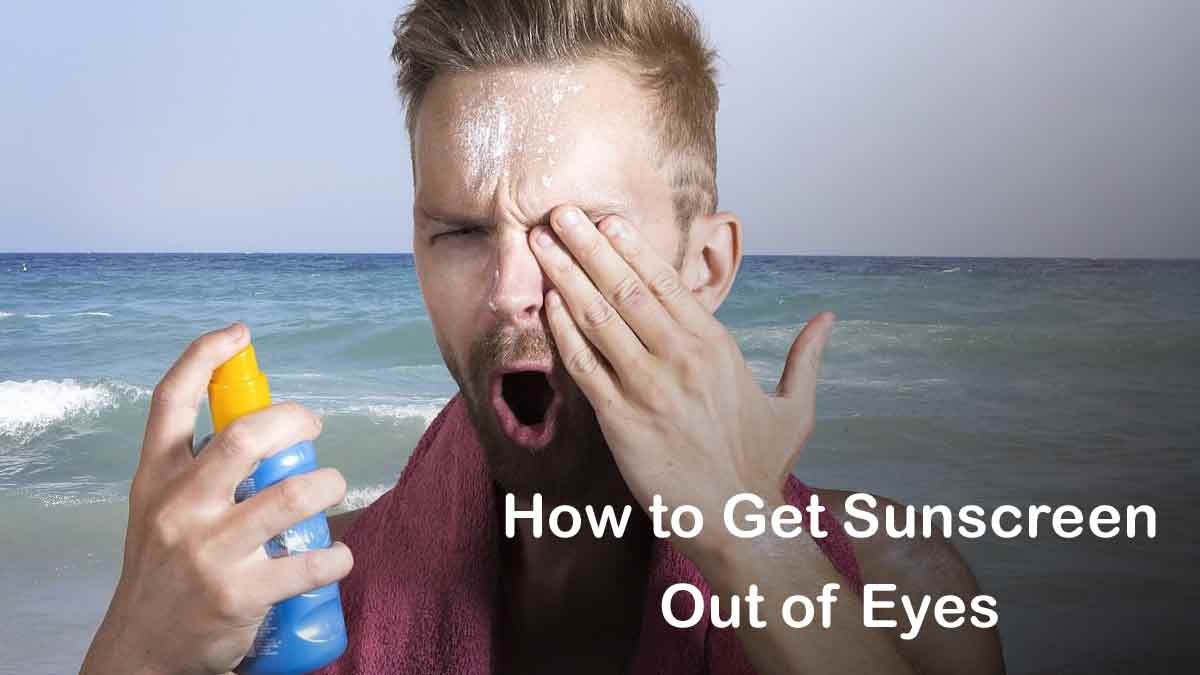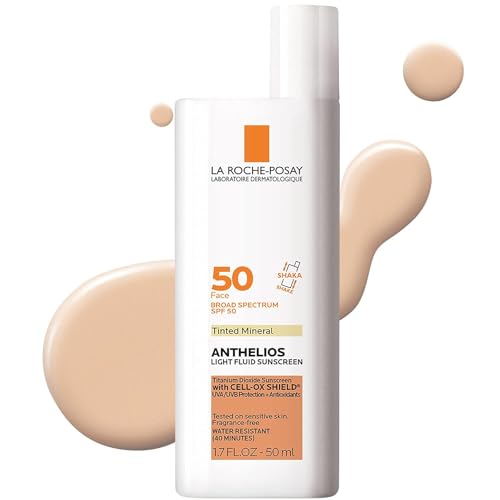We’ve all been there. You’re enjoying a beautiful day at the beach, you’ve slathered on your sunscreen, and then – ouch! – sunscreen in eyes. It’s a common problem, but why does sunscreen burn my eyes? Well, many sunscreens contain chemicals that can irritate the eyes. When sunscreen gets into your eyes, these chemicals can cause a burning sensation. But don’t worry, it’s not just you. This is a common issue that many people face, especially during the sunny summer months.
But what happens if sunscreen gets in your eyes? Is it dangerous? Can your eyeballs get sunburned? The good news is that while it might be uncomfortable, getting sunscreen in your eyes is not usually dangerous. However, it can cause temporary discomfort and vision blurriness. And while your eyeballs can’t technically get sunburned, prolonged exposure to the sun without proper eye protection can lead to other serious eye conditions.
More from Glowing Gorgeous: Find out here the Best Silicone-Free Moisturizers And Why Do You Care
- Immediate Relief: What to Do If You Get Sunscreen in Your Eyes
- Prevention: How to Keep Sunscreen Out of Eyes
- Eye Care Post Sunscreen Exposure
- What to Do If Sunscreen Gets Into Babies and Kids' Eyes
- Face Sunscreens That Won't Burn Eyes
- User Experiences: Why My Eyes Burn
- Eye Protection: Can You Sunburn Your Eyes?
- FAQs
- Conclusion
Immediate Relief: What to Do If You Get Sunscreen in Your Eyes
So, you’ve got sunscreen in your eyes. Now what? The first thing you should do is try to get the sunscreen out of your eyes. This might seem obvious, but in the moment, it can be easy to panic. The best way to get sunblock out of eyes is to rinse them with clean, lukewarm water. You can do this by splashing water into your eyes or by using a gentle stream from a shower or faucet.
But what if your eyes are still burning after you’ve rinsed them? How do you stop eye stinging or burning? One way is to use a warm compress. Soak a clean cloth in warm water, wring it out, and then place it over your closed eyes. The warmth can help to soothe the burning sensation. If your eyes are still uncomfortable after trying these methods, it might be a good idea to contact a healthcare professional for advice.
Prevention: How to Keep Sunscreen Out of Eyes
Prevention is always better than cure, right? So, how can you prevent getting sunscreen in your eyes in the first place? One way is to use a sunscreen that doesn’t sting eyes. There are many brands out there that offer sunscreens specifically designed for sensitive areas like the face and eyes. These sunscreens are often mineral-based and are less likely to cause irritation.
But what about the rest of your face? Should you put sunscreen on your eyelids? Absolutely! The skin around your eyes is very delicate and can be easily damaged by the sun. However, you should be careful when applying sunscreen around your eyes. Try to avoid getting it too close to your eyes, and consider using a sunscreen stick for easier application.
Eye Care Post Sunscreen Exposure
So, you’ve managed to get the sunscreen out of your eyes and you’ve learned how to prevent it from happening again. But what about aftercare? How do you remove mineral sunscreen from your skin? And how do you stop eyes from burning after they’ve been irritated?
To remove mineral sunscreen, you can use a gentle cleanser and warm water. Be sure to rinse thoroughly to remove all traces of the sunscreen. If your eyes are still burning after being exposed to sunscreen, you can try using over-the-counter eye drops to soothe them. However, if the burning continues, it’s a good idea to seek medical advice.
In the end, the most important thing is to protect your eyes from the sun. So, even if you’ve had a bad experience with sunscreen in your eyes, don’t let that stop you from using it. Just be carefulwhen applying it, and remember to wear sunglasses for extra protection. After all, your eyes are just as important as your skin when it comes to sun protection.
What to Do If Sunscreen Gets Into Babies and Kids’ Eyes
Sunscreen is a crucial part of protecting your child’s delicate skin from harmful UV rays. However, it can be a bit tricky when it comes to their eyes. If sunscreen gets into your baby or child’s eyes, it can cause discomfort and even temporary vision blurriness. Here’s what you should do:
First and foremost, don’t panic. While it may be uncomfortable, it’s usually not a serious situation.
Encourage your child to blink several times. Blinking can help to remove small amounts of sunscreen from the eye.
More from Glowing Gorgeous: Find out here Hyram’s Recommended Face Sunscreens For The Summer
Use a clean, damp cloth to gently wipe away any sunscreen from around the eye area. Be careful not to rub the eye itself as this can cause further irritation.
Rinse your child’s eye with lukewarm water. You can do this by gently pouring a cup of water over the eye or by encouraging your child to blink their eye in a bowl of water.
If your child is old enough, you can have them try to rinse their eye out themselves in the shower. The running water can help to flush out the sunscreen.
If the irritation continues after rinsing, consider using a saline solution or artificial tears to help soothe the eye.
If your child’s eye is still irritated after trying these steps, it’s a good idea to call a healthcare professional for advice.
Remember, prevention is always better than cure. When applying sunscreen, take care to avoid the eye area and use a sunscreen stick or mineral-based sunscreen for the face, which is less likely to irritate the eyes. Also, consider using other forms of sun protection like hats and sunglasses for further protection.
Face Sunscreens That Won’t Burn Eyes
Due to the irritant nature of their ingredients, chemical sunscreens are more likely to burn your eyes. To avoid this type of eye pain, it may be best to use a sunscreen that only contains minerals — such as titanium dioxide and zinc oxide — in its active ingredients. Those will less likely burn your eyes, and there are tons of options available but here’s a few quick ones.
One of my personal favorites is the EltaMD UV Daily Broad-Spectrum SPF 40. EltaMD UV Daily Broad-Spectrum SPF 40 is a dermatologist-recommended facial sunscreen that provides broad-spectrum protection against UVA and UVB rays. It’s a lightweight, sheer lotion that can be worn alone or under makeup. It’s also fragrance-free, paraben-free, and noncomedogenic, making it suitable for sensitive skin. The moisturizer is enriched with hyaluronic acid to boost moisture retention and diminish fine lines. This sunscreen is ideal for normal, combination, and post-procedure skin.
Key active ingredients include Zinc Oxide 9.0%, Octinoxate 7.5%, and Hyaluronic Acid.
Another great option is the Obagi Medical Sun Shield Matte Broad Spectrum SPF 50. It is a powerful sunscreen that provides protection from harmful UVA and UVB rays. It has a sheer, matte finish that makes it perfect for everyday use. The formula is non-greasy and PABA-free, making it suitable for most skin types, including sensitive skin. It also contains active ingredients that help to prevent signs of aging caused by the sun.
Key active ingredients include Zinc Oxide 10.5% and Octinoxate 7.5%.
For those who prefer a mineral-based sunscreen, the SkinMedica Essential Defense Mineral Shield SPF 35 is a great choice. This lightweight, sheer sunscreen is suitable for all skin types, including post-procedure skin. It’s also free of parabens and fragrances.
Key active ingredients include Zinc Oxide and Titanium Dioxide.
Lastly, the “Revision Skincare Intellishade Original Tinted Moisturizer SPF 45” is a 5-in-1 product that corrects, protects, conceals, brightens, and hydrates the skin. RIt helps to reduce the appearance of fine lines and wrinkles and gives the skin a touch of sheer, healthy color. It is suitable for all skin types and can be applied easily with fingertips.
The key active ingredients include Octinoxate 7.5%, Octisalate 5%, Titanium Dioxide 3.5% and Zinc Oxide 3%.
User Experiences: Why My Eyes Burn
Now, let’s talk about some common experiences people have when it comes to sunscreen and eye irritation. Have you ever wondered, “why does sweat burn my eyes?” Well, sweat can contain salt and other substances that can irritate the eyes. Similarly, sunscreen can also cause a burning sensation when it mixes with sweat and gets into your eyes.
And it’s not just sunscreen and sweat that can cause your eyes to burn. Many people find that their eyes burn when they cry. This is because tears can also contain substances that irritate the eyes, especially if you’ve been crying a lot.
So, why is my eye burning even when I’m not using sunscreen, sweating, or crying? There could be several reasons for this. It could be due to dryness, allergies, or an infection. If your eyes are always burning, it’s a good idea to see a healthcare professional to find out the cause.
Eye Protection: Can You Sunburn Your Eyes?
We’ve talked a lot about sunscreen and eyes, but what about the sun itself? Can you sunburn your eyes? The answer is yes, you can. This condition is known as photokeratitis, and it’s essentially a sunburn on the cornea, the clear front surface of your eye. It can be caused by exposure to ultraviolet (UV) rays from the sun, especially in snowy conditions or at high altitudes where UV radiation is more intense.
So, can your eyeballs get sunburned? Technically, no. The term “sunburned eyeballs” is often used to describe photokeratitis, but it’s not a true sunburn. However, the symptoms can be similar, including pain, redness, blurriness, and sensitivity to light.
So, how can you protect your eyes from the sun? One way is to wear sunglasses that block 100% of UV rays. You can also wear a wide-brimmed hat to shade your eyes from the sun. And of course, don’t forget to apply sunscreen on your face and eyelids, but be careful not to get it in your eyes!
FAQs
Can You Go Blind from Getting Lotion in Your Eye?
While getting lotion in your eye can be uncomfortable and cause temporary vision blurriness, it’s unlikely to cause blindness. However, it’s important to rinse your eye with clean water as soon as possible to remove the lotion. If your vision doesn’t return to normal or if you experience prolonged discomfort, it’s a good idea to seek medical attention.
Are Eye Drops Supposed to Burn?
Some eye drops can cause a temporary burning sensation when first applied. This is usually harmless and should subside quickly. However, if the burning sensation persists or if you experience other symptoms such as redness, swelling, or vision changes, you should stop using the eye drops and consult a healthcare professional.
Can Vaseline Blind You?
Vaseline is generally safe to use on the skin around your eyes, but it should not be applied directly to your eyes. If you accidentally get Vaseline in your eyes, it can cause temporary blurriness but it’s unlikely to cause blindness. As with lotion, you should rinse your eyes with clean water if you get Vaseline in them.
How to Get Chlorine Out of Eyes Without Eye Drops?
If you get chlorine in your eyes from swimming in a pool, the best way to remove it is to rinse your eyes with clean, lukewarm water. You can also use a saline solution or artificial tears to help soothe your eyes. If your eyes are still irritated after rinsing them, you should seek medical attention.
Are Allergy Eye Drops Supposed to Burn?
Some allergy eye drops can cause a temporary burning or stinging sensation when first applied. This is usually harmless and should subside quickly. However, if the burning sensation persists or if you experience other symptoms such as redness, swelling, or vision changes, you should stop using the eye drops and consult a healthcare professional.
Conclusion
In conclusion, getting sunscreen or other substances in your eyes can be uncomfortable, but it’s usually not dangerous. The best way to deal with this issue is to rinse your eyes with lukewarm water right away.


 EltaMD UV Daily Facial Sunscreen with Zinc Oxide, SPF 40 , Helps Hydrate and...
EltaMD UV Daily Facial Sunscreen with Zinc Oxide, SPF 40 , Helps Hydrate and... Obagi Sun Shield Matte Broad Spectrum SPF 50 Sunscreen, 3 oz Pack of 1
Obagi Sun Shield Matte Broad Spectrum SPF 50 Sunscreen, 3 oz Pack of 1 SkinMedica Essential Defense Mineral Shield SPF 35 Sunscreen for Face. This...
SkinMedica Essential Defense Mineral Shield SPF 35 Sunscreen for Face. This... Revision Skincare Intellishade Original, 5-in-1 anti-aging tinted moisturizer...
Revision Skincare Intellishade Original, 5-in-1 anti-aging tinted moisturizer...
 La Roche-Posay Anthelios Melt-In Milk Body & Face Sunscreen SPF 60, Oil Free...
La Roche-Posay Anthelios Melt-In Milk Body & Face Sunscreen SPF 60, Oil Free... La Roche-Posay Anthelios Tinted Sunscreen SPF 50, Ultra-Light Fluid Broad...
La Roche-Posay Anthelios Tinted Sunscreen SPF 50, Ultra-Light Fluid Broad... innisfree Daily UV Defense Sunscreen Broad Spectrum SPF 36 Face Lotion, 1.69 Fl...
innisfree Daily UV Defense Sunscreen Broad Spectrum SPF 36 Face Lotion, 1.69 Fl...
Comments